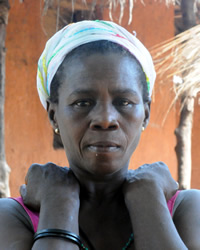Upper Guinea Crioulo is a hybrid language that contains elements of Portuguese and local African languages. About 80 % of the lexicon is from Portuguese. It is spoken by people in three countries in West Africa: Guinea-Bissau, Guinea, and Senegal. Others speak it in the Netherlands, the United States, and Portugal.
Upper Guinea Crioulo emerged in the 1400s when Portuguese sailors and traders arrived on the West coast of Africa. It was developed by Africans who needed to communicate with the Portuguese. In time, it remained a trade language and a source of identity to those who speak it. Even after Guinea-Bissau's independence in 1973, it remained a trade language and a source of unity. Most remain in West African countries, but they are part of the African diasporas in the United States and the Netherlands.
Upper Guinea Crioulo is used not only for trade, but also for entertainment, music, and storytelling. In the United States, they enjoy cultural celebrations with others from the African diaspora.
Africans in the diaspora, especially in North America, cannot be classified as a single homogenous entity but rather as a vast network of overlapping identities shaped by religion, history, migration patterns, culture, and evolving social contexts. Regardless of their religious or cultural backgrounds, Africans in North America are deeply interconnected through various social networks and associations. They tend to maintain and pursue their religious and cultural values more actively than many other racial groups, even as different social institutions, secular norms, and racial dynamics influence their life experiences. Over time, however, some Africans, particularly those of the younger generation, may gradually assimilate into the individualistic religious lifestyle that characterizes much of North American religious belief and practice, where faith is treated as a personal choice and often takes on a different tone.
One of the strongest binding forces among Africans in North America is their shared experiences of migration, racial profiling, and cultural familiarity, such as common foods, music, and communal values. Nevertheless, due to internal racialization, linguistic heritage, cultural dynamics, and religious identity, some Africans from North Africa, particularly Muslims, may gravitate more toward Arab or Islamic communities than to broader "African" associations. Similarly, Francophone Africans often form their own social networks based on shared language, worldview, and colonial heritage. The individualistic religious environment and sense of cultural superiority that often characterize North American churches have led many African Christians, particularly in the U.S. and Canada, to establish diaspora congregations. These congregations blend African worship styles, music, dance, and language with Western church structures. They serve not only as places of worship but also as centers of social support, networking, and cultural preservation.
Those who speak this language are Christian, mostly Roman Catholic. There is also a strong evangelical element among them. Some are non-religious or Muslim. All kinds of evangelistic materials are in Upper Guinea Crioulo, including a complete Bible.
Upper Guinea Crioulo speakers need the spiritual hunger it takes to allow Jesus to take full control of their lives.
Pray for their spiritual and physical needs to be met in the United States.
Pray for Upper Guinea Crioulo speakers to disciple others, including those from other languages and cultures.
Pray for the Holy Spirit to move powerfully in their families and churches.
Scripture Prayers for the Crioulo, Upper Guinea in United States.
| Profile Source: Joshua Project |










